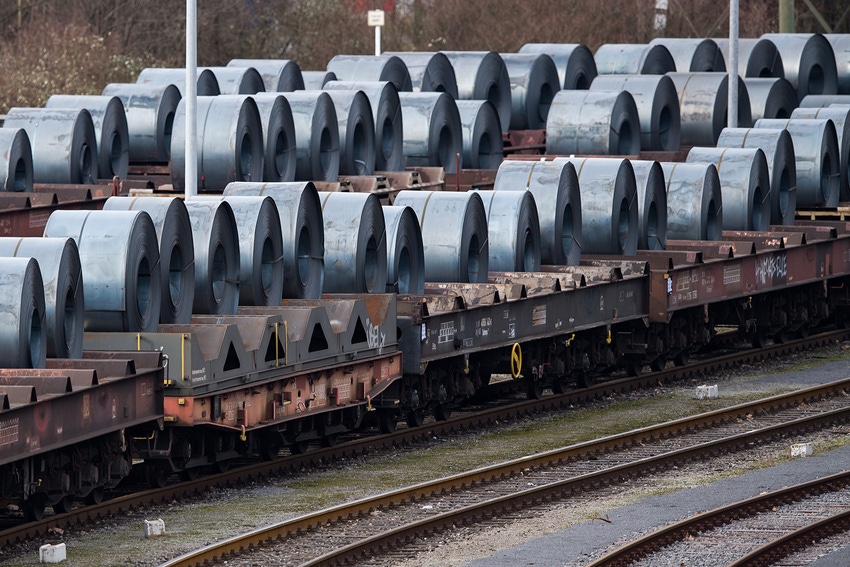NPPC was quick to respond, arguing that agricultural products — specifically pork — are usually the first to take the retaliatory brunt in trade wars.

President Trump announces that tariffs will now be placed on steel and aluminum imports from Canada, Mexico and the European Union, a move that is not being well-received domestically or internationally.
When Trump initially announced such tariffs in early March, the caveat was added that Canada, Mexico and the EU would be exempted as long as progress was being made in North American Free Trade Agreement renegotiations and EU trade talks. Those exemptions have expired.
National Pork Producers Council was quick to respond to Trump’s tariff announcement, long arguing that agricultural products, specifically pork, are usually the first to take the retaliatory brunt in trade wars.
Jim Heimerl, NPPC president and a hog farmer from Johnstown, Ohio, says in a statement: “The National Pork Producers Council has consistently stated its concern about retaliation against U.S. agriculture, including pork, in response to tariffs placed by the United States on steel and aluminum imports. Today’s decision to impose tariffs on steel and aluminum from Mexico and Canada, critical export markets, significantly heightens our concern as Mexico is already threatening to retaliate against U.S. pork. U.S. pork shipped $1.5 billion of product to Mexico, its largest export market, and $792 million to Canada, its fourth-largest market, last year.
“Global export market uncertainty has resulted in considerable lost value for U.S. pork producers. According to Iowa State University Economist Dermot Hayes, hog futures dropped $18 per animal, amounting to a $2.2 billion loss on an annualized basis, since March 1 when speculation about U.S. pork access to the critical Chinese market began.
“The market disruption caused by export market uncertainty comes at a time when U.S. pork is expanding production to record levels. Five new pork processing plants have recently opened or will soon begin operations, increasing U.S. pork production capacity by approximately 10% from 2015 levels by next year. Exports accounted for more than $53 of the average $149 value of a hog last year and supported over 110,000 U.S. jobs.
“We call for an end to these trade disputes so that hard-working U.S. pig farmers can do what they do best: meet global demand for one of our nation’s most competitive export products, one that favorably impacts U.S. trade imbalances with countries around the world.”
Trump’s tariff announcement is not only raising the ire of locals, as it also rankles U.S. trade partners.
Speaking on a Global Trade Outlook panel at the World Meat Congress, representatives from the European Union and Mexico express their disappointment in the announcement.
Jesus Zorrilla, minister counselor for Agriculture Delegation of the European Union, tells the World Meat Congress immediately after the announcement that the situation on trade between the EU and the United States is very bad today.
“For the European Union, this is very bad news, very bad news. These arbitrary sanctions on steel and aluminum on countries that have nothing to do with the oversupply of these products is a contradiction from what we have heard on free and fair trade,” declares Zorrilla. “We are very concerned. We (E.U.) have no option but to launch a panel into WTO and apply rebellious measures to make things more fair.”
“Mexico is also very disappointed in the decision and action taken today by the United States,” says Kenneth Smith, chief negotiator for NAFTA for the Mexican Ministry of Economy, speaking on the same panel. “We have clearly stated from the beginning of the 232 investigation that Mexico represents absolutely no threat to the U.S. national security. We are NAFTA partners. We have been so for almost 25 years along with Canada.”
Smith also reminds the WMC that Mexico is the second largest buyer of U.S. steel.
“It is very unfortunate in context of trade agreement that has worked very well for the last 24 years to face these trade issues now. Mexico will have to take equivalent measures, and we will be imposing them shortly,” stresses Smith.
According to The Hill, a statement from the Mexican government says, “Mexico reiterates its position against protectionist measures that affect and distort international commerce in goods. In response to the tariffs imposed by the United States, Mexico will impose equivalent measures to various products like flat steels (hot and cold foil, including coated and various tubes), lamps, legs and shoulders of pork, sausages and food preparations, apples, grapes, blueberries, various cheeses, among others, up to an amount comparable to the level of affectation.”
U.S. Meat Export Federation President and CEO Dan Halstrom says in a statement, “It will be very unfortunate if U.S. pork exports to Mexico, which deliver tremendous benefits to both the U.S. supply chain and to Mexican consumers, importers, processors, retailers and restaurants, no longer enjoy duty-free access to this critical market. It is especially frustrating to see U.S. pork caught up in a dispute that has nothing whatsoever to do with pork trade. If these tariffs are implemented, they will negatively impact millions of consumers and thousands of people in the meat and livestock industries on both sides of the border. USMEF is hopeful that this impasse will be resolved as soon as possible, with duty-free access for U.S. pork maintained. This is especially important now that key competitors such as the European Union are making market access gains in Mexico and view it as a promising market for their pork products.”
USMEF also says that Canada’s Department of Finance also announced that the Canadian government intends to impose countermeasures in response to the steel and aluminum tariffs.
USDA Secretary Sonny Perdue, also at the World Meat Congress, says “the U.S., Canada and Mexico have too much in common to allow a trade disruption.”
About the Author(s)
You May Also Like



